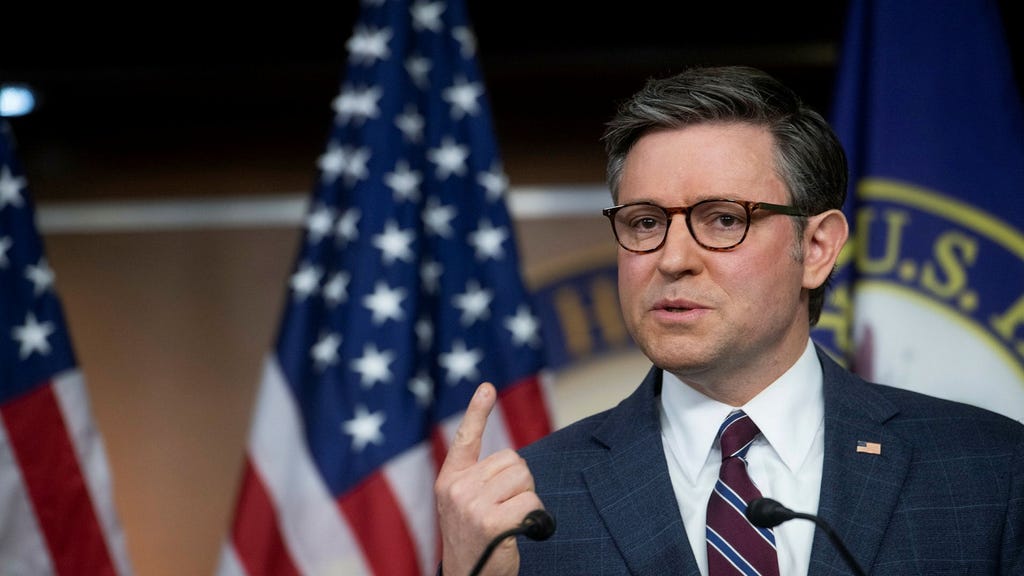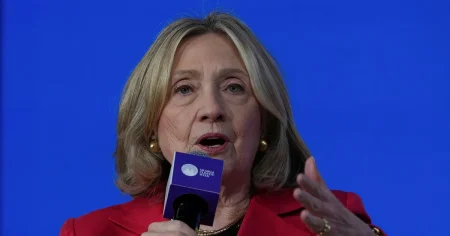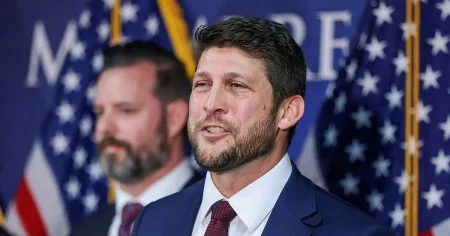The political landscape in the United States is currently fraught with tension as House Speaker Mike Johnson faces a challenging reelection bid. The razor-thin margin of control in the newly elected Congress, described by Johnson himself as ”the smallest in American history,” has intensified the pressure on him to secure enough votes to retain his speakership. This precarious situation stems largely from the recent pre-Christmas budget battle, a contentious political showdown that left deep fissures within the Republican party and exposed Johnson to criticism from within his own ranks. The budget dispute, a high-stakes negotiation involving crucial government funding and politically sensitive spending cuts, angered a segment of Republican representatives who felt that Johnson’s handling of the situation was inadequate or compromised core party principles. This internal dissent has significantly weakened Johnson’s position and cast a long shadow over his prospects for reelection. The looming specter of a potential leadership challenge underscores the fragility of his current hold on power.
The budget battle itself, a complex and multifaceted conflict, became a lightning rod for various ideological and political factions within the Republican party. Fiscal conservatives, advocating for stringent spending cuts and a balanced budget, clashed with more moderate Republicans who prioritized maintaining government services and avoiding a potentially damaging government shutdown. This internal struggle manifested in heated debates, procedural maneuvers, and ultimately, a compromised budget deal that satisfied few and angered many. Johnson’s attempts to navigate this complex political terrain, seeking a path that would avert a government shutdown while appeasing the diverse factions within his party, ultimately left him vulnerable to criticism from both sides. Those who favored deeper cuts accused him of caving to pressure from Democrats and moderate Republicans, while those concerned about the impact of drastic cuts felt he had not fought hard enough to protect vital programs. This precarious balancing act, while arguably necessary to avert a crisis, ultimately eroded his support base and contributed to the current uncertainty surrounding his leadership.
Adding another layer of complexity to this already volatile situation is the involvement of former President Donald Trump. While no longer holding office, Trump continues to wield considerable influence within the Republican party and has publicly pledged his support to Johnson, promising to intervene if the Speaker encounters difficulties in his reelection bid. This intervention, however, is a double-edged sword. While Trump’s endorsement carries weight among a significant portion of the Republican base, it also risks alienating those within the party who are seeking to move beyond the Trump era and embrace a more traditional conservative platform. Furthermore, Trump’s involvement could further polarize the situation, exacerbating existing divisions within the party and potentially making it even more difficult for Johnson to secure the necessary votes. The extent and nature of Trump’s potential intervention remain unclear, but his presence looms large over the unfolding political drama.
The implications of this precarious political situation extend far beyond the immediate question of Johnson’s speakership. The narrow margin of control in Congress means that any legislation, particularly on contentious issues, will require delicate negotiations and compromises. This environment could lead to legislative gridlock, further hindering the government’s ability to address pressing national challenges. Moreover, the deep divisions within the Republican party, exposed and exacerbated by the budget battle, threaten to destabilize the party’s long-term prospects. The ongoing struggle between different factions, including Trump loyalists, fiscal conservatives, and moderates, raises questions about the party’s future direction and its ability to present a unified front on key policy issues. This internal strife could have significant repercussions for the 2024 presidential election and beyond.
The upcoming vote on Johnson’s speakership will be a critical test of his leadership and a barometer of the broader political climate within the Republican party. His ability to secure the necessary votes will depend on his capacity to bridge the divides within his party and persuade skeptical colleagues that he is the right person to lead them forward. The outcome of this vote will have significant implications not only for the future of the House of Representatives but also for the broader political landscape in the United States. A successful reelection would likely be interpreted as a sign of stability, albeit fragile, within the Republican party, while a failure to secure the speakership would undoubtedly trigger a period of intense political turmoil and uncertainty.
The current situation facing Mike Johnson underscores the deep political divisions that continue to grip the United States. The budget battle, Trump’s continued influence, and the razor-thin margins in Congress have created a highly volatile political environment. The upcoming speakership vote will be a pivotal moment, not just for Johnson’s political future, but for the future direction of the Republican party and the ability of the US government to effectively address the challenges facing the nation. The outcome of this vote will have far-reaching consequences, shaping the political landscape for months and possibly years to come. The struggle for power within the Republican party and the broader political divisions in the country promise a period of continued uncertainty and intense political maneuvering.














